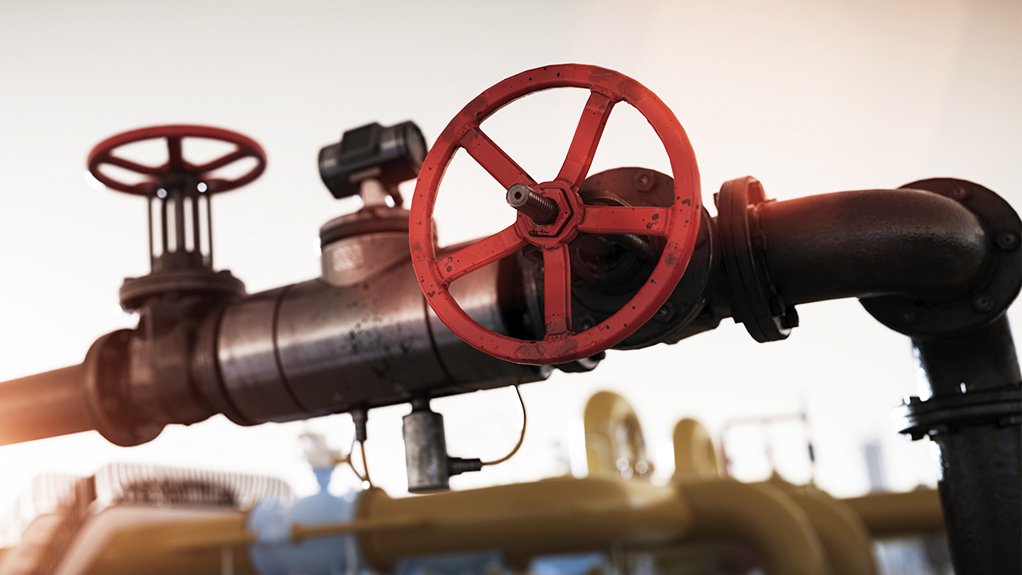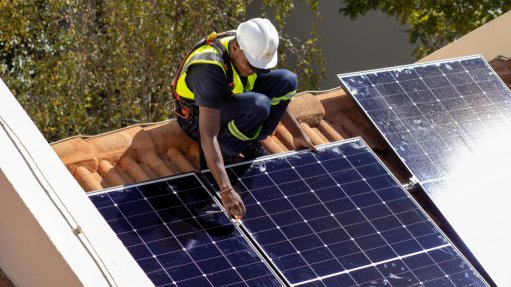Decisions, collaboration in next few months are crucial to bridge 2026 gas cliff, IGUA-SA warns
Large industrial gas users are starting to prepare for what will likely be South Africa’s next big energy crisis, the imminent shortage of natural gas.
Petrochemicals manufacturer Sasol, as the monopoly supplier of large-scale natural gas, in August last year announced that South Africa was heading for a “gas cliff” in that supply of gas to industrial users will be suspended by June 2026.
This suspension relates to gas flows from Pande and Temane, in Mozambique, drying up. These resources were secured by Sasol alongside the South African government In the early 2000s.
Although there are major gas developments under way in Namibia and Mozambique, it is of little consequence to South Africa owing to infrastructure limitations to gas-demand nodes such as Gauteng.
Similar restrictions inhibit the potential use of any gas recently found by Total at the Brulpadda and Luiperd prospects off South Africa’s Southern Cape coast.
The economic feasibility of all other prospective developments, such as Kudu, Karoo shale, Mamba and Lesedi, is unproven and has no clear timeline for development.
Lower to no gas supply poses an existential threat to South Africa’s manufacturing base, since many primary manufacturers, including members of the Industrial Gas Users Association of South Africa (IGUA-SA) such as Arcelor Mittal, Mondi, Illovo, South32, South African Breweries, Hulamin, Coca-Cola, Nampak and Scaw Metals Group, rely on gas for industrial processes.
South African industrial gas users directly employ 70 000 people and contribute between R300-billion and R500-billion a year to the economy. A cessation in the supply of gas, particularly in Gauteng and KwaZulu-Natal, will result in multiple plant closures and a significant reduction in manufacturing output.
Besides the risk to the country’s manufacturing capacity, more than 400 small- and medium-sized enterprises, several hospitals and about 8 000 households will be directly impacted by a suspension in gas supply.
Gas is also an essential tool for decarbonisation purposes, which will set South Africa further behind on its climate change mitigation targets.
IGUA-SA CEO Jaco Human said in a media briefing hosted on February 27 that there were no confirmed supply solutions that would come on stream early enough to act as a sufficient source of independent supply.
As it stands, there will be a 12- to 18-month gap between day zero when Sasol suspends its supply and the finalisation of any feasible replacement supply.
Where possible, businesses would be forced to switch to fuels that were more expensive and more environmentally damaging, with repercussions for consumer pricing and carbon emissions. In many instances, fuel source substitution would not be economically or practically feasible, Human explained.
The knock-on impact of gas shortages will be acutely felt by consumers through supply shortages and price increases across the steel, aluminium, mining, agriculture, paper, glass, ceramics, construction, automotive and food and beverage sectors. This will also extend across indirectly related industries that supply these manufacturers.
The lack of gas will also pose a threat to South Africa’s regional competitiveness and South Africa’s balance of payments.
Human believes the next four months will be crucial to develop the required agreements for gas infrastructure to substitute the shortfall in supply from 2026 onwards. IGUA-SA is urgently calling on government, as it has since 2019, to engage with key stakeholders in industry to find a solution to this potentially devastating crisis.
Human said the gas cliff started with energy shortages being noted since 2019, with limited to no gas pipeline and receiving infrastructure being built in South Africa. There had also been policy uncertainty as to the future role of gas in South Africa’s energy mix.
This while South Africa has massive offshore gas potential. “The South African State has certainly been in abeyance, with no direction or investment from government. This has resulted in complete market uncertainty,” he adds.
Human said industry had consistently argued for the Gas Utilisation Master Plan to be finalised and released for public comment. If gas was to play the balancing role contemplated in the Integrated Resource Plan, then the infrastructure requirements location of gas-to-power generation facilities and the source of the gas had to be urgently prioritised and rigorously interrogated.
INDUSTRY EFFORTS
With a gas cliff only 30 months away, industrial gas users have started looking into establishing a gas aggregator entity, which can take responsibility for infrastructure investments and underwriting volume flow. This entity may also be able to conclude offtake agreements from gas suppliers and pipeline companies, and trade on a not-for-profit basis, simply to cover costs.
The entity’s commercial participation would be based on volume proportionality. It would be owned by offtakers, including industrial gas users and possibly entities such as the Central Energy Fund and Eskom.
However, since it is not feasible for industry to singlehandedly invest in and develop national-scale private natural-gas infrastructure (including bulk pipelines, liquefied natural gas (LNG) port terminals and regasification terminals), urgent action is required on the part of the South African government to adequately address this crisis, the IGUA-SA states.
That said, industry had actively but unsuccessfully engaged government on possible solutions. There had been two separate applications to import liquefied natural gas and install the required infrastructure, including pipeline networks, since 2010, and both applications were opposed by Sasol and the National Energy Regulator of South Africa, thereby protecting Sasol’s entrenched position, Human explained.
IGUA-SA suggests that the South African government, in line with its existing policies, urgently establish sufficient gas-to-power capacity on the Rompco pipeline to increase the demand for gas energy by 40 PJ/y to 60 PJ/y, which will render gas-receiving infrastructure investment in Matola, Mozambique, economically feasible.
Additionally, Eskom, as part of its short-term power-purchase programme could procure additional electricity from planned gas-to-power developments in Mozambique, and also render gas-receiving infrastructure investment in Matola, Mozambique economically feasible through increased gas volume throughputs.
IGUA-SA is of the view that government can ensure the Rompco and Lily pipelines are linked before 2026 to provide gas energy security for KwaZulu-Natal, as well as provide the financial guarantees to underwrite the investment in gas-receiving infrastructure in Matola to ensure the economic sustainability of the South African manufacturing sector.
Sasol has advised that it will embark on a reasonable, phased reduction of supply, which could be gradually offset by increased reliance on other sources, instead of a unilaterally imposed hard cut-off, however, this is not a long-term solution.
Ultimately, IGUA-SA hopes government will create volume scale, or demand aggregation, with the private sector to finance projects feasibly. The South African economy also requires the State to be a catalyst rather than a controller of gas development.
Human says the State and the private sector should urgently create collaboration structures to address imminent gas energy insecurity.
Comments
Press Office
Announcements
What's On
Subscribe to improve your user experience...
Option 1 (equivalent of R125 a month):
Receive a weekly copy of Creamer Media's Engineering News & Mining Weekly magazine
(print copy for those in South Africa and e-magazine for those outside of South Africa)
Receive daily email newsletters
Access to full search results
Access archive of magazine back copies
Access to Projects in Progress
Access to ONE Research Report of your choice in PDF format
Option 2 (equivalent of R375 a month):
All benefits from Option 1
PLUS
Access to Creamer Media's Research Channel Africa for ALL Research Reports, in PDF format, on various industrial and mining sectors
including Electricity; Water; Energy Transition; Hydrogen; Roads, Rail and Ports; Coal; Gold; Platinum; Battery Metals; etc.
Already a subscriber?
Forgotten your password?
Receive weekly copy of Creamer Media's Engineering News & Mining Weekly magazine (print copy for those in South Africa and e-magazine for those outside of South Africa)
➕
Recieve daily email newsletters
➕
Access to full search results
➕
Access archive of magazine back copies
➕
Access to Projects in Progress
➕
Access to ONE Research Report of your choice in PDF format
RESEARCH CHANNEL AFRICA
R4500 (equivalent of R375 a month)
SUBSCRIBEAll benefits from Option 1
➕
Access to Creamer Media's Research Channel Africa for ALL Research Reports on various industrial and mining sectors, in PDF format, including on:
Electricity
➕
Water
➕
Energy Transition
➕
Hydrogen
➕
Roads, Rail and Ports
➕
Coal
➕
Gold
➕
Platinum
➕
Battery Metals
➕
etc.
Receive all benefits from Option 1 or Option 2 delivered to numerous people at your company
➕
Multiple User names and Passwords for simultaneous log-ins
➕
Intranet integration access to all in your organisation




















